Yepeng Weng
Traversal Verification for Speculative Tree Decoding
May 18, 2025Abstract:Speculative decoding is a promising approach for accelerating large language models. The primary idea is to use a lightweight draft model to speculate the output of the target model for multiple subsequent timesteps, and then verify them in parallel to determine whether the drafted tokens should be accepted or rejected. To enhance acceptance rates, existing frameworks typically construct token trees containing multiple candidates in each timestep. However, their reliance on token-level verification mechanisms introduces two critical limitations: First, the probability distribution of a sequence differs from that of individual tokens, leading to suboptimal acceptance length. Second, current verification schemes begin from the root node and proceed layer by layer in a top-down manner. Once a parent node is rejected, all its child nodes should be discarded, resulting in inefficient utilization of speculative candidates. This paper introduces Traversal Verification, a novel speculative decoding algorithm that fundamentally rethinks the verification paradigm through leaf-to-root traversal. Our approach considers the acceptance of the entire token sequence from the current node to the root, and preserves potentially valid subsequences that would be prematurely discarded by existing methods. We theoretically prove that the probability distribution obtained through Traversal Verification is identical to that of the target model, guaranteeing lossless inference while achieving substantial acceleration gains. Experimental results across different large language models and multiple tasks show that our method consistently improves acceptance length and throughput over existing methods
DenseGrounding: Improving Dense Language-Vision Semantics for Ego-Centric 3D Visual Grounding
May 08, 2025Abstract:Enabling intelligent agents to comprehend and interact with 3D environments through natural language is crucial for advancing robotics and human-computer interaction. A fundamental task in this field is ego-centric 3D visual grounding, where agents locate target objects in real-world 3D spaces based on verbal descriptions. However, this task faces two significant challenges: (1) loss of fine-grained visual semantics due to sparse fusion of point clouds with ego-centric multi-view images, (2) limited textual semantic context due to arbitrary language descriptions. We propose DenseGrounding, a novel approach designed to address these issues by enhancing both visual and textual semantics. For visual features, we introduce the Hierarchical Scene Semantic Enhancer, which retains dense semantics by capturing fine-grained global scene features and facilitating cross-modal alignment. For text descriptions, we propose a Language Semantic Enhancer that leverages large language models to provide rich context and diverse language descriptions with additional context during model training. Extensive experiments show that DenseGrounding significantly outperforms existing methods in overall accuracy, with improvements of 5.81% and 7.56% when trained on the comprehensive full dataset and smaller mini subset, respectively, further advancing the SOTA in egocentric 3D visual grounding. Our method also achieves 1st place and receives the Innovation Award in the CVPR 2024 Autonomous Grand Challenge Multi-view 3D Visual Grounding Track, validating its effectiveness and robustness.
CORAL: Learning Consistent Representations across Multi-step Training with Lighter Speculative Drafter
Feb 24, 2025Abstract:Speculative decoding is a powerful technique that accelerates Large Language Model (LLM) inference by leveraging a lightweight speculative draft model. However, existing designs suffers in performance due to misalignment between training and inference. Recent methods have tried to solve this issue by adopting a multi-step training strategy, but the complex inputs of different training steps make it harder for the draft model to converge. To address this, we propose CORAL, a novel framework that improves both accuracy and efficiency in speculative drafting. CORAL introduces Cross-Step Representation Alignment, a method that enhances consistency across multiple training steps, significantly improving speculative drafting performance. Additionally, we identify the LM head as a major bottleneck in the inference speed of the draft model. We introduce a weight-grouping mechanism that selectively activates a subset of LM head parameters during inference, substantially reducing the latency of the draft model. We evaluate CORAL on three LLM families and three benchmark datasets, achieving speedup ratios of 2.50x-4.07x, outperforming state-of-the-art methods such as EAGLE-2 and HASS. Our results demonstrate that CORAL effectively mitigates training-inference misalignment and delivers significant speedup for modern LLMs with large vocabularies.
Topology-Preserving Adversarial Training
Nov 29, 2023

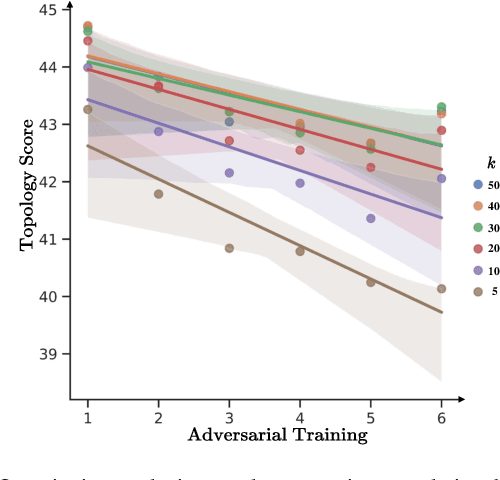
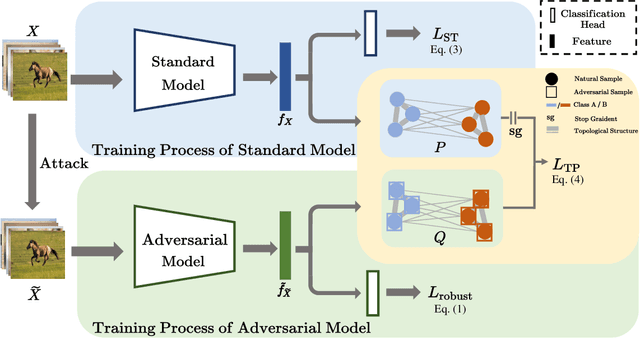
Abstract:Despite the effectiveness in improving the robustness of neural networks, adversarial training has suffered from the natural accuracy degradation problem, i.e., accuracy on natural samples has reduced significantly. In this study, we reveal that natural accuracy degradation is highly related to the disruption of the natural sample topology in the representation space by quantitative and qualitative experiments. Based on this observation, we propose Topology-pReserving Adversarial traINing (TRAIN) to alleviate the problem by preserving the topology structure of natural samples from a standard model trained only on natural samples during adversarial training. As an additional regularization, our method can easily be combined with various popular adversarial training algorithms in a plug-and-play manner, taking advantage of both sides. Extensive experiments on CIFAR-10, CIFAR-100, and Tiny ImageNet show that our proposed method achieves consistent and significant improvements over various strong baselines in most cases. Specifically, without additional data, our proposed method achieves up to 8.78% improvement in natural accuracy and 4.50% improvement in robust accuracy.
Progressive Domain Expansion Network for Single Domain Generalization
Mar 30, 2021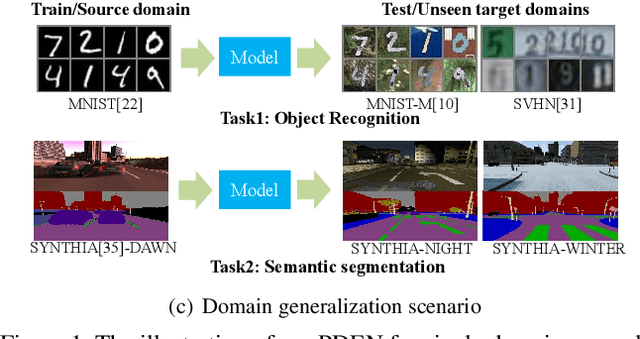

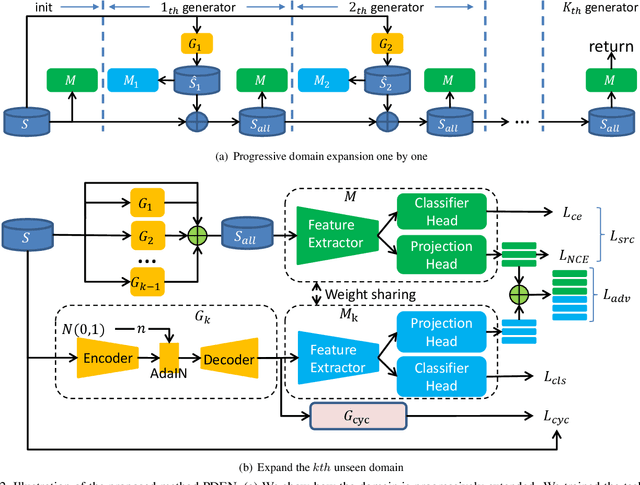
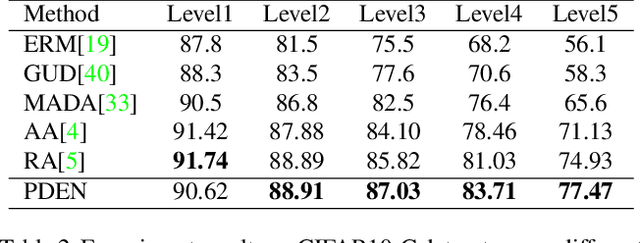
Abstract:Single domain generalization is a challenging case of model generalization, where the models are trained on a single domain and tested on other unseen domains. A promising solution is to learn cross-domain invariant representations by expanding the coverage of the training domain. These methods have limited generalization performance gains in practical applications due to the lack of appropriate safety and effectiveness constraints. In this paper, we propose a novel learning framework called progressive domain expansion network (PDEN) for single domain generalization. The domain expansion subnetwork and representation learning subnetwork in PDEN mutually benefit from each other by joint learning. For the domain expansion subnetwork, multiple domains are progressively generated in order to simulate various photometric and geometric transforms in unseen domains. A series of strategies are introduced to guarantee the safety and effectiveness of the expanded domains. For the domain invariant representation learning subnetwork, contrastive learning is introduced to learn the domain invariant representation in which each class is well clustered so that a better decision boundary can be learned to improve it's generalization. Extensive experiments on classification and segmentation have shown that PDEN can achieve up to 15.28% improvement compared with the state-of-the-art single-domain generalization methods.
 Add to Chrome
Add to Chrome Add to Firefox
Add to Firefox Add to Edge
Add to Edge